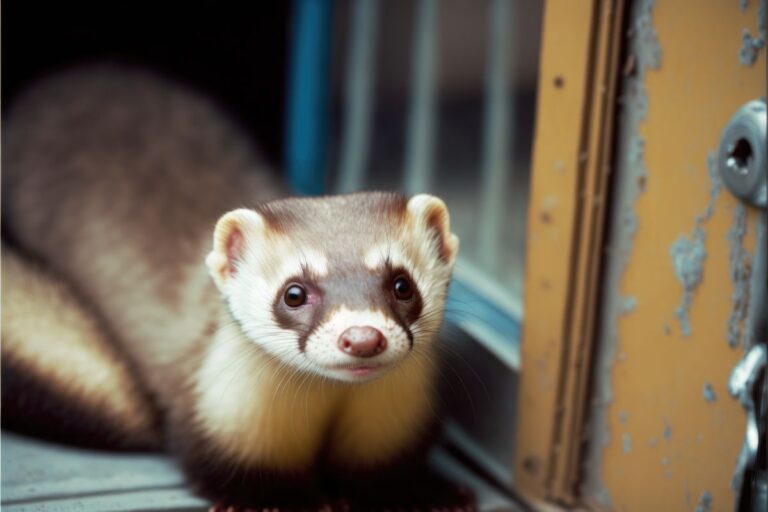Dental Care for Ferrets. How Important Is It?

Even though often forgotten, dental care is important for ferrets. You must maintain oral hygiene for your ferret for them to have strong and healthy teeth. I cannot fail to mention that ferrets are originally carnivorous.
In the wild, your ferret would feed on small animals. He would use his teeth to kill and feed on his catch. Thus, your ferret needs to have strong teeth. Furthermore, he depends on his teeth to chew his food. With tooth decay or loss, your ferret might be unable to eat. This will in return lead to your ferret losing weight.
Now, ferrets have these white and kind of beautiful teeth. However, when you fail to properly maintain oral hygiene, they will no longer be as white. Below, I am going to tell you everything you may need to understand about ferret teeth and oral hygiene.
Dental Care for Ferrets. Ferret Teeth
In most scenarios, you will adopt a ferret who already has teeth. They usually have milk teeth up until the age of 8-9 weeks. Thereafter, these are replaced by the strong ferret canines. Now, your ferret is ready to chew hard foods.
Did you know that ferret teeth will grow from the tip towards the teeth roots? This means that the teeth will grow larger as your ferret grows older.
Dental hygiene should be a priority for you. You should also include it in the next veterinarian visit. However, you should also develop a habit of brushing your ferret’s teeth often, at least twice every month.
Brushing your ferret’s teeth
Brushing your ferret’s teeth is not as difficult. It should take you just a few minutes to completely brush your ferret’s mouth. However, you must get the right tools for brushing his teeth.
Not only will it clean your ferret’s teeth but also prevent dental diseases. Besides, no one wants a pet with terrible breath. You should get a small toothbrush, perfect for your ferret. Now, understand that she will not open the mouth ready for brushing.
This is going to be a gradual process as you must make your ferret comfortable with the brush and paste in his mouth. The good news is that ferret toothpaste can be ingested without any risks. Now, start by massaging your ferret’s mouth with the brush, without the paste.
Some ferrets will resist a brush for the first time. You cannot give up on the first try. If he is docile and a non-biter, you can ease on the brush and start experimenting with your finger. He has to get used to the feeling of something brushing against his teeth and gums as well.
After a few days, your ferret is already used to the feeling of the brush or finger. If you started with the latter, I suggest you invest in a finger latex toothbrush. Once again, gradually introduce the toothbrush to your ferret.
As with training a ferret, you must be patient. Now, you can introduce the taste of his toothpaste. He needs to explore everything that gets in his mouth. Then carefully start brushing his teeth without bruising his gums. You should do this at least twice a month as per general oral hygiene practice.
You might need to ask your friend to help hold your ferret as you brush his teeth. Alternatively, you may scruff him.
Things to remember when brushing your ferret’s teeth
As with everything else, you will need to teach your ferret how to brush his teeth. I have given you a simple outline of how to brush a ferret’s mouth. The following should help you further, especially if you are a first-time ferret owner.
- Ferrets are increasingly becoming popular. You will find toothpaste specifically meant for ferrets. It will be safe for your ferret to swallow and also, you will not need to rinse his mouth after brushing.
- Do not consider using human toothpaste. It is not safe to use for dental care for ferrets.
- Brush his teeth and gums gently, making sure that you do not bruise him.
- If your ferret has a biting problem, you could ask your vet to help clean his teeth until he is docile enough to do it yourself.
- Include dental care for your ferret every time you take him for the regular annual check-ups. Your vet will conduct dental scaling, leaving his teeth clean with no plaque. This is especially important to remove tartar from your ferret’s mouth. Dental scaling will be done after putting your ferret to sleep through anesthesia.
What other factors influence dental care for ferrets
While oral hygiene improves dental health, it is not all that counts. Other things may lead to poor dental health. Ferrets are carnivorous, and yet we feed commercial foods to our pets. This does not mean that these foods are unsafe for him but they feed on hard foods.
In their natural habitat, ferrets would hunt and kill small animals for prey. Being carnivorous, they would tear up the prey and even chew bones, which is healthy for their teeth. Right now, you can access commercial food specifically for ferrets from your local pet store.
Sometimes you may supplement this diet with frozen prey. I advise against feeding alive prey to your ferret. It could spread diseases and parasites to your ferret. Instead, you can offer him frozen chick or mice to supplement his diet.
Common Dental Issues in ferrets
While it is important to maintain oral hygiene, some ferret owners forget about it completely. Other times, your ferret will have dental issues from birth. Below, I am going to talk about dental diseases in ferrets.
Gingivitis and periodontal disease are the most common dental issues in ferrets. In most circumstances, dental diseases are a result of poor hygiene. When was the last time you brushed your ferret’s teeth?
Gingivitis and Periodontal disease
As with humans, ferrets can also suffer from periodontal disease. On the other hand, gingivitis will be the early signs of this dental problem. It is characterized by the inflammation of the gums.
This happens when bacteria found in the gingival crevice accumulates on the enamel of a tooth. It is usually referred to as the plaque and it could get larger and irritate the ferret’s gum. This could cause a lot of pain to your ferret.
Gingivitis and periodontal disease’s symptoms include bad breath and bleeding gums. Well, the affected teeth might also change from white to brownish. It is as a result of the accumulated plaque.
Also, other factors may contribute to periodontal disease. These may include improper diet such as soft foods. Older ferrets are also at the risk of developing gingivitis and periodontal disease, especially if you have neglected dental care.
If your ferret tends to chew his cage and toys, then this is also a contributing factor. Keep all small chewable items from your ferret’s reach. Also, you must find a way to make him stop biting the cage bars. This is likely to happen when your ferret is bored in the cage. Get him several toys to keep him occupied as you go about your day.
If your ferret seems to be in pain and refuses to eat, take him to the vet. Your vet will conduct a physical examination to rule out the possibility of any of these diseases. Also, your vet might ask about the history of your ferret’s dental care.
Tooth Cavities
Your vet should also check for tooth cavities in ferrets. This is related to the type of food you are feeding your ferret. Those that may not have gotten certain nutrients as babies may not have strong teeth.
Even though the tooth cavity is not as common in ferrets, it is a possibility. Once again, it is the reason I insist on having his dental care check-up as he has his regular one. Your vet can always catch any dental problems in ferrets early and offer the best treatment for them.
Do not feed your ferret soft foods that could get stuck between teeth and cause a bacterial infection. This could eventually develop into periodontal disease.
Chipped and broken tooth
Most veterinary offices have witnessed a broken tooth problem in ferrets. Usually, it is as a result of chewing large bones and other hard non-food items. Unfortunately, this can be a very painful experience for your ferret.
In this case, your ferret may lose his tooth, based on the level of damage. However, you can always do root canal implants or use an artificial tooth. Your ferret must have all his teeth for him to chew food.
As I mentioned above, losing teeth can be fatal for a ferret. I mean, they feed on hard dry food which means he cannot chew. I suggest that you keep an eye on your ferret’s teeth and oral hygiene.
What about teething baby ferrets?
Now, as I had mentioned earlier, your ferret will undergo teething as a baby. Even when they are not teething, kits can have bad breath. Talk to your vet and they will recommend the best medicine for teething kits.
You should start dental care when from the very first day of owning a ferret. If you take care of his teeth from a young age, you may not have to deal with dental problems later on.
Conclusion
Dental care for ferrets is as important as his overall health. However, most ferret owners tend to forget about their pet’s dental health. This is not only unhygienic but it could cause problems for your ferret in the future.
Besides bad breath, I am sure you want to get rid of all the plaque on his teeth. I suggest you consult your vet if you are not sure of how to go about brushing your pet’s mouth. Note that this is going to be a gradual process for your ferret.
Purchase a small toothbrush and toothpaste made for ferrets. Follow the steps as outlined above to brush your pet ferret’s teeth. You must be patient with him as he gets conversant with this new routine. He should be comfortable with tooth brushing within a few days.
At the same time, do not brush his teeth too often. Do not forget to ask your vet to check on your ferret’s teeth during your regular visits. Occasionally, ask your vet to perform dental scaling to remove all the food particles from below the gum.
As always, I would like to hear about your dental care practices for your ferret. Have you experienced any dental problems with your pet ferret?






